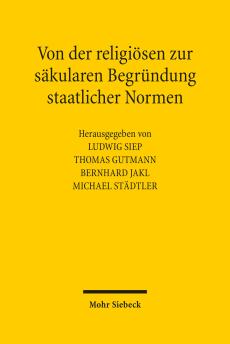An edited volume from the Cluster of Excellence “Religion and Politics” examines the relationship between religion and politics in modern philosophy and in systemic legal questions today. The volume, “From the Religious to the Secular Legitimation of State Norms”, is edited by the legal scholar Prof. Thomas Gutman and the philosophers Prof. Ludwig Siep and Dr Michael Städtler from the Cluster of Excellence “Religion and Politics”, as well as by Dr Bernhard Jakl from the Department of Civil Law, Philosophy of Law and Medical Law of the University of Münster. The volume originated in the similarly titled conference at the Cluster in October 2009 and has been published by Mohr Siebeck Press in Tübingen.
The modern legal state claims to treat its citizens in an undifferentiated manner as free and equal persons, the editors explain. Because of this claim, the legitimation of state norms excludes particularistic ethical concepts just as much as it does arbitrariness or special privileges. The modern state claims to pass laws generally without consideration of arbitrariness or individual interests. But that raises a specific question regarding the state’s relationship to the great religions, which on the one hand make their own claims to universal validity and on the other are, as historically contingent revelations, themselves particularistic. According to the editors, the claim to be a legal state requires, that its norms be neutral and secular. This leads to the philosophically central question: can the basic, common characteristics of humanity such as reason, be applied normatively without resorting to specific cultural experiences? A further question asks how these norms relate to traditional particularistic behaviour.
Relationship of Politics and Religion
In their contributions, philosophers and legal scholars examine the relationship of religion and politics against the background of the modern legal state, from which a series of philosophical-historical and legal problems emerge. Starting from their own respective disciplines, the authors open up an interdisciplinary discussion. The link of the contributions therefore becomes the relationship between elements of natural law, culture and positive law in the legitimation of state norms on the one hand, and the justification of subjective rights such as human rights on the other.
Literature: Siep, Ludwig/ Gutmann, Thomas/ Jakl, Bernhard/ Städtler, Michael (eds.): Von der religiösen zur säkularen Begründung staatlicher Normen. Zum Verhältnis von Religion und Politik in der Philosophie der Neuzeit und in rechtssystematischen Fragen der Gegenwart, Tübingen: Mohr Siebeck Verlag 2012, X, 336 Seiten, ISBN 978-3-16-150642-0, 69,00 Euro (with contributions from Thomas Gutmann, Bernhard Jakl, Ludwig Siep, Michael Städtler, and Christian Walter).


